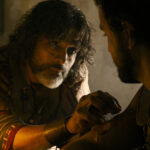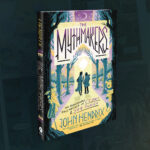I smiled pretty much throughout The Peanut Butter Falcon, a delightful new indie film that earns every adjective you might hear people ascribe to it: “heartwarming,” “life-affirming,” “feel-good,” and so on. This is a rare movie that is sincere, joyous, and un-cynical, but also artfully made. It’s not cheap or cheesy. In dark and anxious times, we need more films like this. They offer audacious but necessary visions of hope, “what if?” fantasies that bridge what is and what ought to be.
I don’t know whether the filmmakers (Tyler Nilson and Michael Schwartz) are Christians, but Falcon feels like a model for what a quality faith-based film could look like. The 98-minute movie has a confident grasp of goodness, a beautifully compassionate and dignifying way of looking at its characters, and an infectious joy grounded in its observations about the dynamics of friendship and family—observations that led me to ponder God and praise him.
Restorative Family
Inspired by Huckleberry Finn, Southern Gothic fiction, and reminiscent of boys-on-the-run films by David Gordon Green (especially Undertow) and Jeff Nichols (especially Mud), Falcon is an adventure story where innocence and sin, play and danger often intersect. But more than anything, Falcon is a story about family.
In this case it’s “family” in the found sense, as circumstances bring three very different people together to form unlikely but beautiful bonds that, as the film progresses, take on a more family-like shape. Tyler (Shia LaBeouf) is a troubled fisherman on the run from bad guys whose equipment he destroyed. Zak (Zack Gottsagen) is a 22-year-old man with Down syndrome, who in the opening scenes escapes from the retirement home where he lives. Eleanor (Dakota Johnson) takes care of Zak at the home and spends the movie searching for him on North Carolina’s Outer Banks. Each of these three has wounds from their family past. Tyler lost a brother in an automobile accident. Zak’s parents abandoned him. Eleanor is a widow. When the three eventually become friends and coalesce as a healthy, functioning (if messy) family unit (“friends are the family you choose,” one of them points out), you can almost see their scars begin to heal.
Such is the restorative nature of family when it functions as it should.
Films like this offer audacious but necessary visions of hope—‘what if?’ fantasies that bridge what is and what ought to be.
Delighting in Familial Love
What Falcon has to say about friendship and family is not narrated but embodied—through the postures and facial expressions of the actors, through scenes of rope swinging, practicing secret handshakes, Tyler teaching Zak to swim, practicing wrestling moves, and so forth. Great films create space for characters to simply be with one another. These moments may not serve efficient storytelling purposes, but they are often where the magic happens. And these magical moments are plentiful in Falcon.
It’s a joy to watch Zak and Tyler begin to trust one another, serve and sacrifice for one another, lean on and just enjoy one another. A wordless scene of the two sitting side by side, looking out at the sea after a remarkable baptism scene (literally: Zak gets baptized midway through the film), brought me to tears. Likewise, I was moved by a scene where Tyler speaks a truth over Zak that few in his life have uttered: “You are strong.” Zak responds by speaking words over Tyler that he’s also rarely heard: “You are a good guy.” In this interchange we see the power of friendship to call us out of old identities and spur us on into newness and growth.
When Eleanor enters the picture and the duo becomes a trio, the two-way delight and care between Zak and Tyler becomes a three-way dynamic of familial love. Each member of the trio has their own identity; each pair has their own dynamic. Eleanor and Tyler develop a romantic love, and a parental relationship of sorts with Zak. Tyler and Zak have a father-son dynamic but also a brotherly love. Eleanor is both a mother and an older sister to Zak. In it all, everyone delights in the other.
Does it sometimes feel a bit like a too-perfect fairy tale? Yes. But that’s the point. In our age of broken families, relational fragmentation, rising loneliness, and dehumanizing rhetoric, we desperately need art to do more than wallow in pain and cynicism about what’s bad. We need art to give us attractive pictures of what’s good and remind us why it’s worth fighting for. And there are few greater goods than the family.
We need art to do more than wallow in pain and cynicism about what’s bad. We need art to give us attractive pictures of what’s good and remind us why it’s worth fighting for.
Notes in a Chord
Last week at the beach with my wife and 1-year-old son, I had one of those moments of joy that feels like a caress of God. I watched my wife and son smile and laugh at each other, delighting in each other. I watched my son crawl over to me, pulling himself up to my lap, smiling from ear to ear when he caught my eye. I delighted in his delight in me, and vice versa. I delighted in my wife, and how she and her baby (and she and I) delight in each other. And I wondered if maybe God created the family unit, in part, to give his creation a little glimpse of their Creator’s glorious triune nature. I thought of this as I watched Falcon’s central trio in their expressions of mutual care and delight. The joy of watching them love one another felt like the joy I experienced on the beach—a joy downstream from a distant headwater, a faint echo of some thunderous heavenly symphony.
In his book Traces of the Trinity, Peter Leithart explores the ways that trinitarian theology illuminates our world, from family to sex to musical chords. He writes: “Christians believe that the triune God created the world, and that should have some implications for the kind of world that it is.”
This was in my mind as I thought about why the mutual love on display in Falcon was so soul-satisfying. Maybe we resonate with these stories not only because they remind us what’s possible in the glorious good of a family, but because they glimpse the infinitely more glorious Good of God, whose very being is a “triune fellowship of love” within what Fred Sanders calls “the happy land of the Trinity.” Sanders says, “This is what the doctrine of the Trinity helps us learn with greater precision: that God is love. The triune God is a love that is infinitely high above you, eternally preceding you, and welcoming you in.”
We are “welcomed in” to this divine love only by way of Christ’s atoning sacrifice on the cross (Heb. 10:19–23)—an important theological truth that, to be sure, movies like Falcon don’t spell out. But to the extent that they shine a spotlight on the beauty of family and on healthy, interdependent love between humans—whom God created to image himself (Gen. 1:27)—they are common-grace notes that join creation’s larger chords of praise.
Involved in Women’s Ministry? Add This to Your Discipleship Tool Kit.
 We need one another. Yet we don’t always know how to develop deep relationships to help us grow in the Christian life. Younger believers benefit from the guidance and wisdom of more mature saints as their faith deepens. But too often, potential mentors lack clarity and training on how to engage in discipling those they can influence.
We need one another. Yet we don’t always know how to develop deep relationships to help us grow in the Christian life. Younger believers benefit from the guidance and wisdom of more mature saints as their faith deepens. But too often, potential mentors lack clarity and training on how to engage in discipling those they can influence.
Whether you’re longing to find a spiritual mentor or hoping to serve as a guide for someone else, we have a FREE resource to encourage and equip you. In Growing Together: Taking Mentoring Beyond Small Talk and Prayer Requests, Melissa Kruger, TGC’s vice president of discipleship programming, offers encouraging lessons to guide conversations that promote spiritual growth in both the mentee and mentor.

































